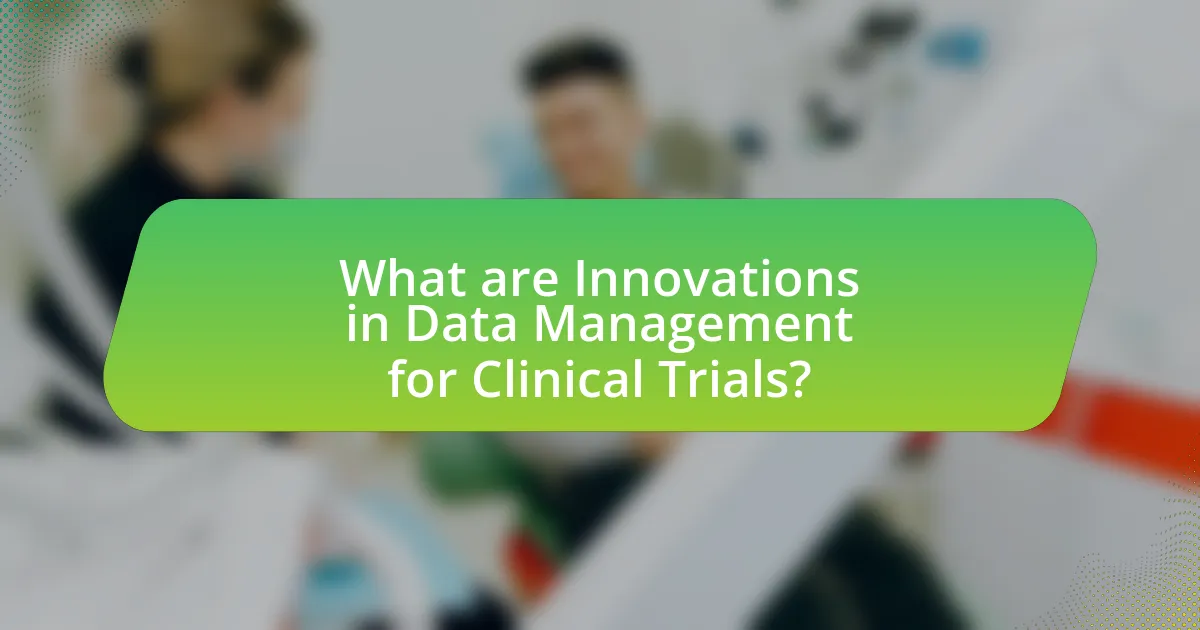Innovations in data management for clinical trials encompass advancements such as real-time data analytics, electronic data capture (EDC) systems, and artificial intelligence (AI) technologies. These innovations enhance trial efficiency, accuracy, and participant engagement by streamlining data collection, reducing errors, and enabling predictive analytics. Key technologies driving these changes include AI, machine learning, and blockchain, which improve data integrity and security. Effective data management is crucial for regulatory compliance and scientific validity, addressing challenges like data integrity and integration of diverse sources. The article explores the impact of these innovations on clinical trial processes, patient recruitment, and overall trial outcomes, while also discussing future directions and best practices for organizations.

What are Innovations in Data Management for Clinical Trials?
Innovations in data management for clinical trials include the use of real-time data analytics, electronic data capture (EDC) systems, and artificial intelligence (AI) for data monitoring and analysis. Real-time data analytics allows researchers to make informed decisions quickly, improving trial efficiency and patient safety. EDC systems streamline data collection and reduce errors associated with traditional paper-based methods, enhancing data integrity. AI technologies facilitate predictive analytics, enabling the identification of potential issues before they arise, thus optimizing trial outcomes. These innovations are supported by studies showing that EDC can reduce data entry errors by up to 50% and that AI can significantly accelerate patient recruitment processes.
How do these innovations impact the clinical trial process?
Innovations in data management significantly enhance the clinical trial process by improving efficiency, accuracy, and participant engagement. For instance, the implementation of electronic data capture (EDC) systems reduces data entry errors and accelerates data collection, allowing for real-time monitoring and analysis. A study published in the Journal of Clinical Trials found that EDC systems can decrease trial timelines by up to 30%, thereby expediting the overall drug development process. Additionally, innovations such as remote monitoring and mobile health applications facilitate better participant retention and adherence, leading to more reliable outcomes. These advancements collectively streamline operations, reduce costs, and improve the quality of clinical trial data.
What specific technologies are driving these innovations?
Artificial intelligence (AI) and machine learning (ML) are the specific technologies driving innovations in data management for clinical trials. These technologies enhance data analysis, enabling faster and more accurate insights from large datasets. For instance, AI algorithms can identify patterns in patient data that may lead to improved trial designs and patient recruitment strategies, significantly reducing the time and cost associated with clinical trials. Additionally, blockchain technology is being utilized to ensure data integrity and security, providing a transparent and tamper-proof record of trial data. This combination of AI, ML, and blockchain is transforming how clinical trial data is managed, leading to more efficient and effective research outcomes.
How do innovations improve data accuracy and reliability?
Innovations improve data accuracy and reliability by implementing advanced technologies such as artificial intelligence, machine learning, and blockchain. These technologies enhance data validation processes, reduce human error, and ensure secure data transactions. For instance, AI algorithms can analyze large datasets to identify inconsistencies and anomalies, leading to more accurate data collection. Additionally, blockchain technology provides a tamper-proof ledger, ensuring that data integrity is maintained throughout the clinical trial process. Studies have shown that the integration of these innovations can reduce data discrepancies by up to 30%, thereby significantly increasing the reliability of clinical trial outcomes.
Why is data management crucial in clinical trials?
Data management is crucial in clinical trials because it ensures the accuracy, integrity, and accessibility of trial data, which are essential for regulatory compliance and scientific validity. Effective data management allows for systematic collection, storage, and analysis of data, minimizing errors and facilitating timely decision-making. According to the FDA, approximately 30% of clinical trial data contains errors, highlighting the need for robust data management practices to maintain data quality and reliability. Furthermore, proper data management supports transparency and reproducibility, which are fundamental principles in clinical research, ultimately leading to more reliable outcomes and faster approval processes for new therapies.
What challenges do clinical trials face in data management?
Clinical trials face significant challenges in data management, including data integrity, regulatory compliance, and integration of diverse data sources. Data integrity issues arise from human error, inconsistent data entry, and lack of standardized protocols, which can compromise the reliability of trial results. Regulatory compliance is critical, as trials must adhere to stringent guidelines set by authorities like the FDA, requiring meticulous documentation and reporting. Additionally, the integration of diverse data sources, such as electronic health records and patient-reported outcomes, complicates data management, making it difficult to achieve a cohesive dataset for analysis. These challenges can lead to delays in trial timelines and increased costs, ultimately impacting the development of new therapies.
How can effective data management enhance trial outcomes?
Effective data management enhances trial outcomes by ensuring accurate, timely, and accessible data, which facilitates informed decision-making throughout the trial process. When data is systematically organized and managed, it reduces errors and inconsistencies, leading to more reliable results. For instance, a study published in the Journal of Clinical Trials found that trials employing robust data management practices experienced a 30% reduction in data discrepancies, which directly correlated with improved participant safety and adherence to protocols. This structured approach also accelerates data analysis, allowing for quicker adjustments to trial methodologies based on real-time insights, ultimately leading to more successful and efficient clinical trials.
What are the key trends in data management for clinical trials?
Key trends in data management for clinical trials include the adoption of real-time data analytics, increased use of electronic data capture (EDC) systems, and the integration of artificial intelligence (AI) for data processing. Real-time data analytics allows for immediate insights and quicker decision-making, enhancing trial efficiency. EDC systems streamline data collection and reduce errors associated with manual entry, as evidenced by a 30% reduction in data discrepancies reported in studies utilizing these systems. AI integration facilitates predictive analytics and improves patient recruitment strategies, with research indicating that AI can enhance recruitment efficiency by up to 50%. These trends collectively aim to improve data accuracy, speed up trial timelines, and optimize resource allocation in clinical research.
How is artificial intelligence being utilized in data management?
Artificial intelligence is utilized in data management by automating data collection, enhancing data analysis, and improving data quality. AI algorithms can process large volumes of clinical trial data quickly, identifying patterns and insights that would be difficult for humans to detect. For instance, machine learning models can predict patient outcomes based on historical data, enabling more informed decision-making in clinical trials. Additionally, AI-driven tools can detect anomalies in data sets, ensuring higher accuracy and reliability in data management processes. This application of AI not only streamlines operations but also supports regulatory compliance by maintaining data integrity throughout the trial process.
What role does cloud computing play in modern data management?
Cloud computing plays a crucial role in modern data management by providing scalable storage, enhanced collaboration, and real-time data access. This technology allows organizations to store vast amounts of data securely and access it from anywhere, facilitating efficient data sharing among clinical trial teams. According to a report by Gartner, 70% of organizations are expected to adopt cloud services by 2025, highlighting the growing reliance on cloud solutions for data management. Additionally, cloud computing supports advanced analytics and machine learning, enabling researchers to derive insights from large datasets quickly, which is essential for the success of clinical trials.
How do regulatory requirements influence data management innovations?
Regulatory requirements significantly influence data management innovations by necessitating compliance with standards that enhance data integrity, security, and accessibility. For instance, regulations such as the FDA’s 21 CFR Part 11 mandate electronic records to be trustworthy and reliable, prompting the development of advanced data management systems that incorporate robust validation and audit trail features. These innovations not only ensure adherence to regulatory standards but also improve operational efficiency and data quality in clinical trials, as evidenced by the adoption of cloud-based solutions that facilitate real-time data sharing and monitoring while maintaining compliance.
What are the implications of data privacy and security in clinical trials?
Data privacy and security in clinical trials are critical as they protect sensitive patient information and ensure compliance with regulations. The implications include the necessity for robust data protection measures to prevent breaches, which can lead to legal consequences and loss of public trust. For instance, the Health Insurance Portability and Accountability Act (HIPAA) mandates strict guidelines for handling patient data, and violations can result in significant fines. Additionally, ensuring data security fosters participant confidence, which is essential for recruitment and retention in trials. A study published in the Journal of Clinical Research Best Practices highlights that 70% of participants are more likely to enroll in trials that demonstrate strong data privacy practices. Thus, the implications of data privacy and security directly influence the integrity and success of clinical trials.

What are the benefits of adopting innovative data management practices?
Adopting innovative data management practices enhances efficiency, accuracy, and compliance in clinical trials. These practices streamline data collection and analysis, reducing the time required for trial execution. For instance, the use of real-time data monitoring can lead to quicker decision-making, which is crucial in clinical settings. Additionally, innovative practices often incorporate advanced technologies such as artificial intelligence and machine learning, which improve data accuracy by minimizing human error. A study published in the Journal of Clinical Trials found that implementing innovative data management solutions can reduce data discrepancies by up to 30%, thereby increasing the reliability of trial outcomes. Furthermore, these practices ensure better regulatory compliance, as they often include automated reporting features that align with industry standards.
How do these practices enhance patient recruitment and retention?
Innovations in data management for clinical trials enhance patient recruitment and retention by streamlining processes and improving communication. Efficient data management systems allow for real-time tracking of patient engagement and feedback, which helps identify and address barriers to participation. For instance, studies have shown that utilizing electronic health records and patient registries can increase recruitment rates by up to 30% by targeting eligible patients more effectively. Additionally, these systems facilitate personalized communication, ensuring that patients receive timely updates and support, which can lead to higher retention rates. Research indicates that trials with robust data management practices see a 20% increase in patient retention, as patients feel more informed and valued throughout the study.
What strategies can be employed to leverage data for better patient engagement?
To leverage data for better patient engagement, healthcare organizations can implement personalized communication strategies based on patient data analytics. By analyzing patient demographics, preferences, and health history, organizations can tailor messages and interventions that resonate with individual patients, thereby increasing engagement levels. For instance, a study published in the Journal of Medical Internet Research found that personalized health messages led to a 30% increase in patient adherence to treatment plans. Additionally, utilizing mobile health applications that track patient data and provide real-time feedback can enhance engagement by empowering patients to take an active role in their health management. This approach not only fosters a sense of ownership but also improves health outcomes, as evidenced by research from the American Journal of Managed Care, which reported that patients using such applications showed a 25% improvement in chronic disease management.
How do innovations streamline the data collection process?
Innovations streamline the data collection process by automating data entry and enhancing data accuracy through advanced technologies. For instance, the use of electronic data capture (EDC) systems reduces manual input errors and accelerates the collection timeline, allowing for real-time data access and monitoring. According to a study published in the Journal of Clinical Trials, EDC systems can decrease data collection time by up to 30%, significantly improving efficiency in clinical trials. Additionally, mobile applications and wearable devices facilitate continuous data gathering from participants, ensuring comprehensive and timely information collection. These innovations collectively enhance the reliability and speed of data collection, ultimately leading to more effective clinical trial outcomes.
What cost savings can be achieved through improved data management?
Improved data management can achieve significant cost savings in clinical trials by reducing operational inefficiencies and minimizing data errors. For instance, streamlined data collection processes can decrease the time spent on data entry and validation, leading to a reduction in labor costs. A study by the Tufts Center for the Study of Drug Development found that better data management practices can lower clinical trial costs by up to 30%. Additionally, enhanced data accuracy reduces the need for costly rework and mitigates the risk of regulatory fines associated with non-compliance. Overall, effective data management not only cuts costs but also accelerates the trial timeline, further contributing to financial savings.
How do innovations reduce operational inefficiencies?
Innovations reduce operational inefficiencies by streamlining processes and enhancing data accuracy in clinical trials. For instance, the implementation of electronic data capture (EDC) systems minimizes manual data entry errors and accelerates data collection, leading to faster trial timelines. A study by the Tufts Center for the Study of Drug Development found that EDC can reduce data collection time by up to 30%, significantly improving operational efficiency. Additionally, innovations such as real-time data analytics allow for immediate insights, enabling quicker decision-making and resource allocation, further decreasing inefficiencies in trial management.
What is the return on investment for adopting new data management technologies?
The return on investment for adopting new data management technologies in clinical trials is significant, often yielding a 30% to 50% reduction in data processing costs and time. This improvement is primarily due to enhanced data accuracy, streamlined workflows, and reduced manual intervention. For instance, a study by the Tufts Center for the Study of Drug Development found that implementing advanced data management systems can lead to a 20% increase in trial efficiency, translating to faster patient recruitment and reduced time to market for new therapies. These quantifiable benefits demonstrate that investing in modern data management technologies not only lowers operational costs but also accelerates the overall clinical trial process.

What are the future directions for data management in clinical trials?
Future directions for data management in clinical trials include the integration of artificial intelligence and machine learning to enhance data analysis and decision-making processes. These technologies can automate data collection, improve patient recruitment, and enable real-time monitoring of trial progress, thereby increasing efficiency and accuracy. Additionally, the adoption of decentralized clinical trials is expected to grow, allowing for remote patient participation and data collection through digital health technologies. This shift can lead to more diverse patient populations and improved data quality. Furthermore, regulatory frameworks are evolving to accommodate these innovations, ensuring that data management practices remain compliant while fostering innovation.
How will emerging technologies shape the future of data management?
Emerging technologies will significantly shape the future of data management by enhancing data collection, storage, and analysis capabilities. Technologies such as artificial intelligence (AI), machine learning, and blockchain are revolutionizing how data is managed, particularly in clinical trials. For instance, AI algorithms can analyze vast datasets quickly, identifying patterns and insights that would be impossible for humans to detect, thereby improving decision-making processes. Additionally, blockchain technology ensures data integrity and security by providing a decentralized and tamper-proof ledger, which is crucial for maintaining the trustworthiness of clinical trial data. According to a report by Deloitte, the integration of these technologies can reduce data management costs by up to 30% while increasing the speed of data processing, demonstrating their transformative potential in the field.
What potential challenges might arise with these advancements?
Potential challenges that might arise with advancements in data management for clinical trials include data privacy concerns, integration issues, and the need for regulatory compliance. Data privacy concerns stem from the increased use of digital platforms, which can expose sensitive patient information to breaches; for instance, the 2020 Health Insurance Portability and Accountability Act (HIPAA) violations highlighted the risks associated with electronic health records. Integration issues may occur when new technologies do not seamlessly connect with existing systems, leading to data silos and inefficiencies. Additionally, regulatory compliance becomes more complex as innovations evolve, requiring organizations to navigate a landscape of changing laws and guidelines, such as the FDA’s evolving stance on digital health technologies. These challenges necessitate careful planning and robust strategies to ensure that advancements enhance rather than hinder clinical trial processes.
How can organizations prepare for future innovations in data management?
Organizations can prepare for future innovations in data management by adopting agile methodologies and investing in advanced technologies such as artificial intelligence and machine learning. Agile methodologies enable organizations to quickly adapt to changes and incorporate new data management practices, while AI and machine learning can enhance data analysis and predictive capabilities. According to a report by Gartner, organizations that leverage AI in data management can improve decision-making speed by up to 30%. Additionally, fostering a culture of continuous learning and collaboration among teams ensures that staff are equipped with the latest skills and knowledge to implement innovative data management solutions effectively.
What best practices should organizations follow for effective data management?
Organizations should follow best practices such as establishing clear data governance policies, ensuring data quality, and implementing robust data security measures for effective data management. Clear data governance policies define roles, responsibilities, and processes for data handling, which enhances accountability and compliance. Ensuring data quality involves regular validation and cleaning of data to maintain accuracy and reliability, as poor data quality can lead to erroneous conclusions in clinical trials. Implementing robust data security measures protects sensitive information from breaches, which is critical in maintaining patient confidentiality and regulatory compliance. According to a study by the National Institute of Standards and Technology, organizations that adopt comprehensive data governance frameworks experience a 30% reduction in data-related risks, underscoring the importance of these best practices.
How can teams ensure compliance with evolving regulations?
Teams can ensure compliance with evolving regulations by implementing a robust regulatory monitoring system. This system should include regular updates on regulatory changes, training sessions for staff on new requirements, and the integration of compliance checks into data management processes. For instance, the FDA frequently updates guidelines for clinical trials, and organizations that subscribe to regulatory news services can stay informed about these changes. Additionally, utilizing compliance management software can streamline the tracking of regulatory requirements and facilitate audits, ensuring that teams remain aligned with the latest standards.
What tools and resources are essential for successful data management?
Essential tools and resources for successful data management in clinical trials include data management software, electronic data capture (EDC) systems, data analytics tools, and cloud storage solutions. Data management software, such as Medidata or Oracle’s Siebel, facilitates the organization and tracking of clinical trial data, ensuring compliance with regulatory standards. EDC systems streamline data collection and reduce errors by allowing real-time data entry and monitoring. Data analytics tools, like SAS or R, enable researchers to analyze large datasets efficiently, providing insights that can drive decision-making. Cloud storage solutions, such as AWS or Microsoft Azure, offer secure and scalable options for storing vast amounts of data, ensuring accessibility and collaboration among research teams. These tools collectively enhance the efficiency, accuracy, and security of data management processes in clinical trials.






